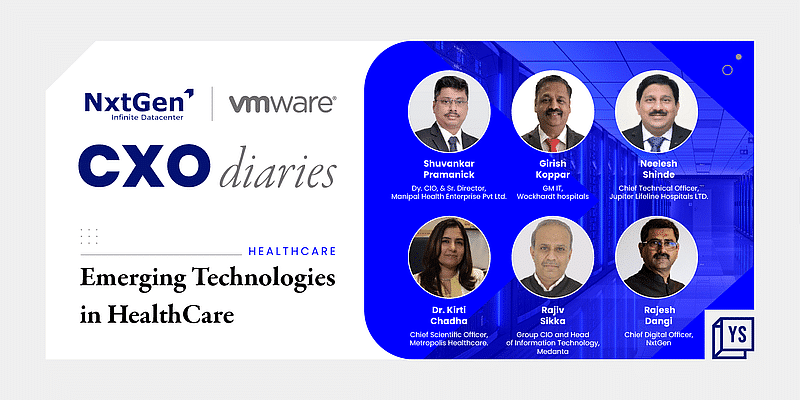Healthcare as a domain has always kept room for some improvement, while banking on its own vision of conditioning and betterment of lives around. Trending times have witnessed the inception of emerging technologies like AI, blockchain, chatbots, voice search, virtual reality, etc.
A quick conglomeration of healthcare and emerging technologies is sure to create wonders, helping doctors, medical professionals, and patients with the needed boost, while seamlessly combining data on a patient’s medical history, real-time health, insurance coverage, and financial information, while reducing costs and improving patient health at the same time.
So, would the adoption of newer technologies improve the state, reaching healthcare to its zenith, or are there certain disadvantages of this paradigm shift?
To discuss and share valuable insights, the sixth episode of CXO Diaries, hosted by NxtGen and VMware in association with YS, roped in a panel of doctors and expert medical professionals featuring Shuvankar Pramanick, Deputy CIO and Senior Director, Manipal Health Enterprises; Neelesh Shinde, CTO, Jupiter Hospital; Dr Kirti Chadha, Chief Scientific Officer, Metropolis Healthcare; Girish Koppar, GM-IT, Wockhardt Hospital; Rajiv Sikka, Group CIO and Head of Information Technology, Medanta – The Medicity Hospital; and Rajesh Dangi, Chief Digital Officer, NxtGen.
Shaping the future of healthcare
The healthcare domain has encountered significant digital transformation in the recent past, backed by government interventions. Explaining the segments under the government’s e-healthcare management system, Shuvankar said, “This starts with measuring the standards of hospital information system (HIS) data. The second one is the concept of telemedicine to increase the bandwidth of healthcare in remote areas, and finally, providing medical services through online government portals.”
Elaborating further on the HIS standards, Shuvankar said that it referred to defining the standard disease classifications across several healthcare groups and providers. Here, the parameters would also include medicines, laboratory data exchange, and digital imaging systems. “Apart from these, government initiatives also include the launching of e-Sushrut, a hospital management information system based on ERP solutions. The system provides accurate, real-time electronic medical records (EMR) of patients while streamlining patient care, and its associated administrative functions,” he added.
In the last few years, especially in the wake of the pandemic, a dire need was felt for change in healthcare infrastructure. “Along with that, we also need to change our mindsets for adopting digital transformations. So, now we have patient-centric, contactless technology,” added Neelesh.
He highlighted the factor of energy efficiency while building a hospital, as the unit cost is always on a rise. “If you have a good building management system (BMS), you would be able to control the temperature and humidity within the hospital, which further helps in dropping down the energy consumption, and that’s what constitutes a smart hospital,” he pointed out.
In the context of biomedical equipment, India has progressed significantly in the recent past. “For instance, we can conduct virtual critical care systems using the Electronic Intensive Care Unit (eICU). So, by sitting at one command center, you can control all the ICUs around the satellite centres. We have also developed lab automation, where AI has made it possible to conduct the proceedings without the hand-holding of an individual,” said Neelesh.
A sharp divide existed between the urban and rural India in the pre-COVID world. “If we are successful in putting the cumulative intelligence of every doctor into a clinical decision support system, lakhs of patients across several locales would be successfully able to implement the cumulative benefit of one expert. So, be it chronic disease, infectious disease, or cancer, we would have AI implemented in every aspect. Besides, we also have a chief digital officer who is spearheading the whole campaign, and all of us are hellbound to use technology for the betterment of doctors, patients, and healthcare professionals, and touch the lives of more patients with the same quality, integrity, and empathy that we were doing previously, and that’s how technology helps to scale us the components,” explained Kirti.
Data privacy and protection
Data is growing at a rapid pace, and therefore, it is crucial to have a structured management system to capture and mind it. Management, along with data security and privacy, are an integral part of healthcare, according to Girish. “As we are capturing a lot more clinical data today than we used to do earlier, we need a specialist to get this data secured. Internal security can be managed by the roles being assigned to your own people, while external security refers to proper checking of the firewalls being in place and real-time monitoring. Cloud is an option when the latter is not in place,” he added.
A majority of legacy hospitals have a dearth of specialists who can mind the bulk amount of data. Thus, the easiest option is to outsource the responsibility to startups with dedicated cloud partners. “For hospitals without a proper infrastructure and with data mining at a rapid pace, cloud solutions work best,” said Girish.
Virtual reality, said Rajiv, plays a bigger role in healthcare, not only for India but also for the world. “The future might predict a scenario when minimum care would be given at the hospital, while maximum care would be given in homes. Thus, remote means mobility and mobility in the future would be the tech rendered for every solution or services,” he noted.
Of course, cost here is an important aspect, with the majority of hospitals already struggling with this. Remote tech is sure to create a dent in their profit margin. “Hospitals and medicare institutes need to understand that this would play an important role in the way they level up the healthcare system in the long run.For instance, Ayushmann Bharat will cover over 10 crore poor and vulnerable families (approximately 50 crore beneficiaries) providing coverage up to Rs 5 lakh per family per year for secondary and tertiary care hospitalisation,” added Rajiv.
Delving deeper into digital health, Rajesh of NxtGen spoke about the electronic health record. Thus, data plays a vital role in the way it is used, managed, secured, and implemented when needed. “With the evolution of new-age technologies like 5G, satellite broadbands, more new data centres are coming up in the rural and district areas. Thus, when these clouds are broken into distributed models, from edge to core, and vice versa, the information, workload, and accessibility for this digital infrastructure are far more distributed, and available to everybody. Finally, today, we have connected medical devices like IoT, and wearables, which interchange data, between patients, applications, and real-time. Thus, it seems that our intellect is also expanding with the usability of the devices,” he explained.
The way forward
Shuvankar predicted that India might emerge as one of the prominent names in the list of digital healthcare nations in the next few years. “With the increased use of telemedicine and appropriate use of data, we are developing infrastructures rapidly, while emerging the ecosystem with digital payments, transport, and e-commerce. Lastly, the awareness regarding digital transformation within the patients is also on a high rise, and with this sensibility, it would become the highest user-based ecosystem in the years to come,” he added.
While Kirti felt that the future lies in tracing down abnormalities through genetic and molecular lab technology, and treating them at a low cost, Girish opined that
the focus should be on inter-operative video data along with at-home treatment facilities.
“AI would change the future of our country, thereby changing the mindset of the people, along with ramping up digital transformation. India is changing on a positive note, and yes, even if it takes time, we would succeed in this endeavour,” said Neelesh.
“Any tech-related system that would enable patients low-cost, efficient healthcare facilities, from any corner of the country is the one to be embraced,” shared Rajiv.







![Read more about the article [DesignUp 2021] From creativity to impact – in conversation with award-winning animator Suresh Eriyat](https://blog.digitalsevaa.com/wp-content/uploads/2021/06/DUE-1623572977433-300x150.png)


